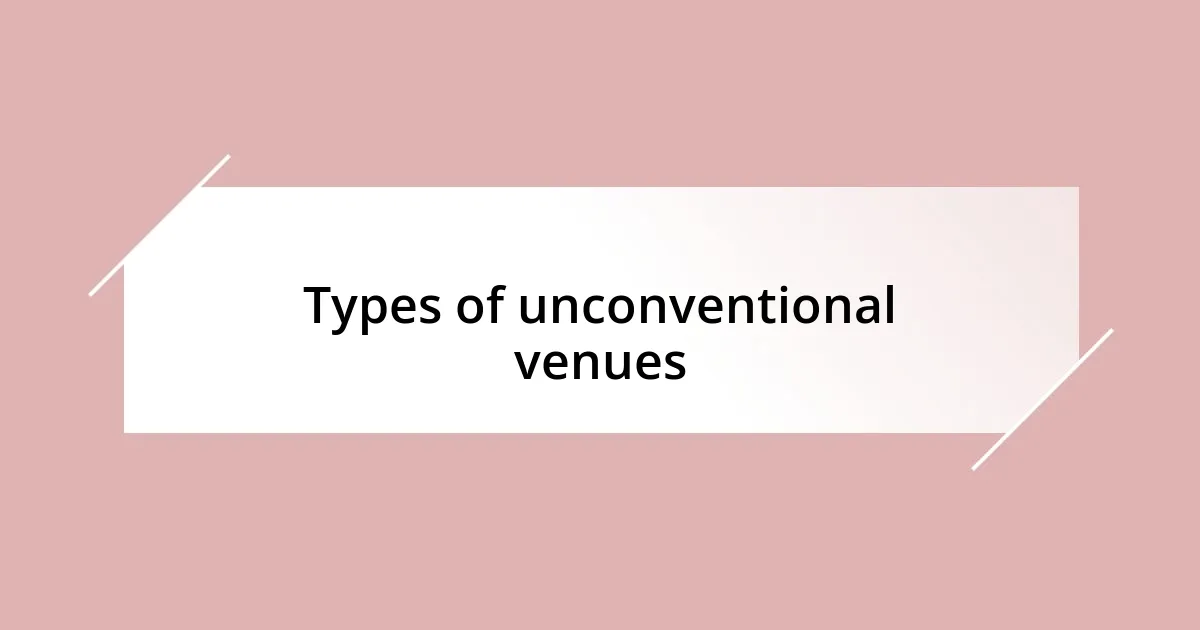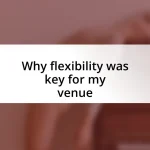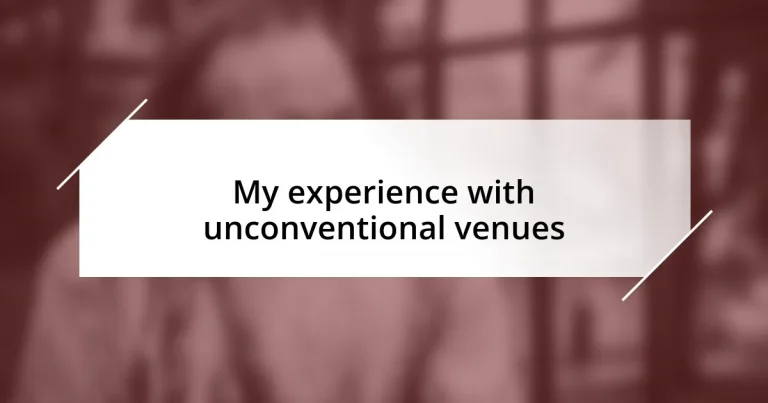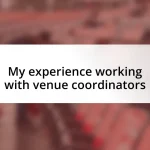Key takeaways:
- Unconventional venues create unique atmospheres that enhance personal and brand storytelling, offering experiences beyond traditional settings.
- Benefits of unique spaces include surprise elements, improved emotional engagement, and flexibility in layout and theme, which foster memorable interactions.
- Logistical planning is crucial for unconventional venues, addressing accessibility, catering solutions, and technical requirements to ensure a seamless event.
- Creative themes can elevate gatherings, allowing participants to engage more deeply, as seen in events like masquerade balls or cultural soirées.

Understanding unconventional venues
Unconventional venues are spaces that often challenge traditional event settings, turning the ordinary into the extraordinary. I remember attending a wedding in an old, repurposed barn, where the rustic charm created an atmosphere that felt genuinely inviting. Have you ever walked into a place that made you feel instantly at home, even if it was just for an evening?
These venues can offer unique atmospheres that reflect a couple’s personality or a brand’s identity in a way that a standard banquet hall might not. I once organized a corporate retreat at a quirky art gallery, surrounded by vibrant colors and creativity. It sparked conversations that would have never happened in a typical conference room, and it struck me just how much space influences our interactions.
From art galleries to botanical gardens, the beauty of unconventional venues lies in their potential for storytelling. What better way to share a vision or celebrate a milestone than in a location that embodies the spirit of your occasion? It’s fascinating to think how a simple change of scenery can elevate an experience to something memorable and meaningful.

Benefits of using unique spaces
One of the most significant benefits of using unique spaces is the element of surprise they bring. I’ve hosted events where the venue itself became a conversation starter. I remember a birthday party in an industrial loft with exposed brick walls and eclectic furnishings; guests arrived expecting a typical celebration but were instead greeted by an atmosphere that felt fresh and exciting. There’s something invigorating about stepping into an unconventional space that sparks curiosity.
Unique venues can enhance the overall experience by providing stunning backdrops and character that traditional locations often lack. When I planned a charity fundraiser in a historical theater, the opulence of the setting not only captured attention but also helped convey the significance of our cause. The sheer grandeur transformed the event, encouraging attendees to engage more deeply with the mission. This experience taught me how much ambiance influences emotions and connections.
Moreover, these distinctive spaces often allow for greater flexibility in layout and design. I booked a rooftop garden for a summer wedding, which not only offered breathtaking views but also encouraged creativity in how we arranged the seating and décor. This adaptability can lead to innovative themes and unique experiences that make events unforgettable. It’s incredible how the right space can facilitate a flow of inspiration and joy, creating lasting memories for everyone involved.
| Benefit | Example |
|---|---|
| Element of Surprise | Guests are intrigued by the unconventional atmosphere. |
| Enhanced Experience | Impactful settings that resonate with the purpose of the event. |
| Flexibility | Opportunities for creative layouts and themes. |

Types of unconventional venues
When I think about unconventional venues, a few distinct types come to mind. Each space carries a unique significance and personality that can shape an event in unexpected ways. For example, hosting a gathering in a vintage train station not only piqued curiosity but also filled the air with nostalgia. There’s something exhilarating about weaving history into modern celebrations that can’t be replicated in conventional spaces.
Here are some types of unconventional venues I’ve come across:
- Warehouses: Often transformed into chic event spaces, warehouses offer a blank canvas for creativity.
- Museums: These venues not only provide artistic backdrops but also spark conversation through various exhibits.
- Rooftop Gardens: With stunning views and fresh air, they create a magical atmosphere for both daytime and evening events.
- Barns: Their rustic charm fosters a cozy, intimate setting perfect for weddings and gatherings.
- Aquariums: Imagine saying “I do” surrounded by vibrant marine life—it’s nothing short of awe-inspiring!
On a personal note, I once attended a networking event at a botanical garden, surrounded by the colors and scents of blooming flowers. The tranquil environment encouraged genuine conversations that felt more heartfelt than in a sterile office space. It reaffirmed my belief that the right location can truly transform the nature of interactions. I realized how important it is to choose venues that resonate with the theme and tone of our gatherings.

Planning logistics for unusual locations
When it comes to planning logistics for unusual locations, I’ve learned that preparation is key. For instance, I once organized a company retreat in an old firehouse. Ensuring proper electrical setups for presentations was crucial, and I had to coordinate with local vendors to rent equipment that fit the venue’s quirks. Thinking ahead helped me mitigate potential issues before they arose.
Navigating parking and accessibility can be challenging with unconventional spaces. During a wine tasting event at a vineyard, I quickly realized that not all guests had convenient access, leading me to arrange shuttle services. It’s fascinating how sometimes the beauty of a location can overshadow practical considerations, but I’ve found that addressing logistics upfront fosters a more enjoyable experience for everyone.
An aspect I always manage carefully is catering, which can be tricky in unique venues. I recall hosting an outdoor festival in a botanical garden where kitchens were practically nonexistent. Collaborating with food trucks turned out to be a joyful surprise, allowing guests to savor delicious meals in a vibrant setting. Have you ever thought how a creative solution to a logistical problem can elevate an event? It’s moments like these that remind me of the importance of flexibility and innovation in planning.

Creative ideas for event themes
Finding a unique theme for an event can make all the difference, and I’ve discovered that embracing the unconventional can spark creativity. One time, I themed a birthday party around a masquerade ball, complete with elaborate masks and ambient candlelight. The excitement in the air was palpable as guests reveled in the mystery and elegance, transforming a typical celebration into a fantastical experience.
Another memorable theme I curated was a “Travel Around the World” soirée, where each room represented a different culture’s food, music, and decor. Guests donned costumes from their chosen country, which turned it into a delightful surprise as they mingled and tasted their way through global delicacies. Seeing everyone enthusiastically engage with different cultures reminded me how themes can break barriers and forge connections among diverse groups.
Then there’s the idea of an “Under the Stars” evening, which can be achieved in a backyard or rooftop venue. I once set up cozy seating with twinkling lights and a fire pit that invited guests to share stories late into the night. The environment creates intimacy, allowing deeper conversations to form. Have you ever noticed how the right theme sets the tone for not only the event but also the connections we make? It’s astonishing how creativity shines through the details, transforming ordinary gatherings into unforgettable experiences.

Case studies of successful events
One standout example of a successful event I organized took place in a former train station—talk about a venue bursting with history! The charm of the exposed brick and high ceilings set the perfect backdrop for a gala, but it posed unique challenges for seating and sound. By strategically placing acoustic panels and opting for circular seating arrangements, we created an atmosphere that not only complemented the venue’s character but also allowed for a truly immersive experience. Isn’t it incredible how a venue can inspire creative solutions and enhance the event’s overall vibe?
Another memorable case involved planning a product launch at an art gallery. Here, the art itself became part of the storytelling. I paired each product feature with a corresponding piece of art, keeping guests intrigued and engaged. Watching their reactions was something special; they weren’t just there to learn about a product but to absorb a multi-sensory experience. How often do we find ourselves in an environment that so seamlessly merges leisure with learning?
Then, I recall a vibrant street fair that I spearheaded to celebrate local businesses. We turned a quiet neighborhood street into a bustling hub of activity, complete with local vendors, live music, and creative workshops. The sense of community that blossomed was palpable, as families gathered, and laughter filled the air. It’s moments like these that remind me of the power of unconventional venues to unite people and create lasting memories. Have you ever felt the magic of a shared experience in an unexpected setting?














